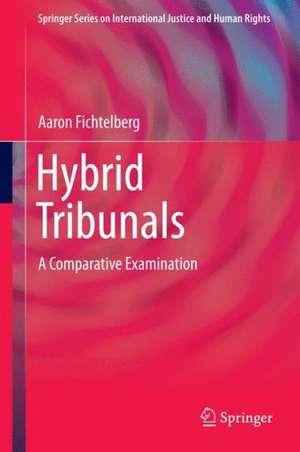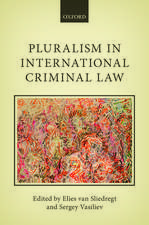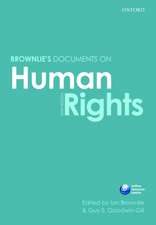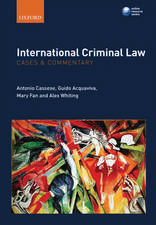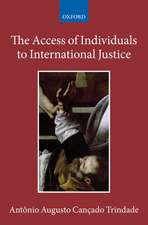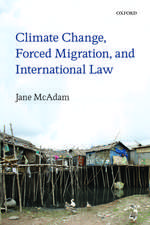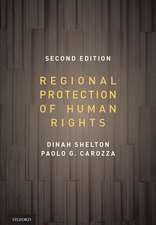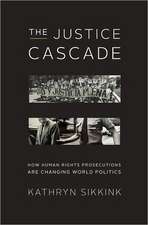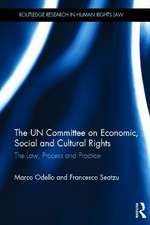Hybrid Tribunals: A Comparative Examination: Springer Series on International Justice and Human Rights
Autor Aaron Fichtelbergen Limba Engleză Hardback – 11 iun 2015
Hybrid tribunals are a form of the international justice where the judicial responsibility is shared between the international community and the local state where they function. These tribunals represent an important bridge between traditional international courts like the International Criminal Court (ICC), the International Criminal Tribunal for the Former Yugoslavia (ICTY), the International Criminal Tribunal for Rwanda (ICTR) and various local justice systems. Because hybrid tribunals are developed in response to large-scale atrocities, these courts are properly considered part of the international criminal justice system. This feature gives hybrid tribunals the accountability and legitimacy often lost in local justice systems; however, by including regional courtroom procedures and personnel, they are integrated into the local justice system in a way that allows a society to deal with its criminals on its own terms, at least in part.
This unique volume combines historical and legal analyses of these hybrid tribunals, placing them within a larger historical, political, and legal context. It will be of interest to researchers in Criminal Justice, International Studies, International Law, and related fields.
| Toate formatele și edițiile | Preț | Express |
|---|---|---|
| Paperback (1) | 384.09 lei 6-8 săpt. | |
| Springer – 9 oct 2016 | 384.09 lei 6-8 săpt. | |
| Hardback (1) | 391.40 lei 6-8 săpt. | |
| Springer – 11 iun 2015 | 391.40 lei 6-8 săpt. |
Preț: 391.40 lei
Nou
Puncte Express: 587
Preț estimativ în valută:
74.90€ • 78.56$ • 62.35£
74.90€ • 78.56$ • 62.35£
Carte tipărită la comandă
Livrare economică 01-15 aprilie
Preluare comenzi: 021 569.72.76
Specificații
ISBN-13: 9781461466383
ISBN-10: 1461466385
Pagini: 216
Ilustrații: XVIII, 206 p.
Dimensiuni: 155 x 235 x 20 mm
Greutate: 0.49 kg
Ediția:2015
Editura: Springer
Colecția Springer
Seria Springer Series on International Justice and Human Rights
Locul publicării:New York, NY, United States
ISBN-10: 1461466385
Pagini: 216
Ilustrații: XVIII, 206 p.
Dimensiuni: 155 x 235 x 20 mm
Greutate: 0.49 kg
Ediția:2015
Editura: Springer
Colecția Springer
Seria Springer Series on International Justice and Human Rights
Locul publicării:New York, NY, United States
Public țintă
ResearchCuprins
Introduction: Hybrid Tribunals in International Justice.- I: Forming the Hybrid Tribunals.- Sierra Leone: Civil War and Justice.- Kosovo: International and Hybrid Justice.- Cambodia: Justice (long) After the Fact.- East Timor: Genocide and Colonialism.- Lebanon: Assassination of Rafic Hariri and Global Justice.- II: Structuring the Tribunals.- Sierra Leone.- Kosovo.- Cambodia.- East Timor.- Lebanon.- III: The Tribunals in Action.- Sierra Leone: Taylor and “The Other”.- Cambodia and Lebanon: Fighting for Independence.- Kosovo and East Timor: Working in the UN System.- IV: Conclusions: Evaluating the Tribunals.- Hybrid Tribunals and Local Justice.- Hybrid Tribunals and International Justice Revisited.- Guidelines for Future Tribunals.
Notă biografică
Aaron Fichtelberg is an Associate Professor in the Department of Sociology and Criminal Justice at the University of Delaware. He has PhD from Emory University, an MA from Depaul University, and an LLM Degree from Utrecht University. Along with this book, he is the author of Law at the Vanishing Point: A Philosophical Analysis of International Law and Crime Without Borders: An Introduction to Criminal Justice. He lives in Wilmington, Delaware with his wife and two sons.
Textul de pe ultima copertă
This book examines hybrid tribunals created in Sierra Leone, Kosovo, Cambodia, East Timor, and Lebanon, in terms of their origins (the political and social forces that led to their creation), the legal regimes that they used, their various institutional structures, and the challenges that they faced during their operations. Through this study, the author looks at both their successes and their shortcomings, and presents recommendations for the formation of future hybrid tribunals.
Hybrid tribunals are a form of the international justice where the judicial responsibility is shared between the international community and the local state where they function. These tribunals represent an important bridge between traditional international courts like the International Criminal Court (ICC), the International Criminal Tribunal for the Former Yugoslavia (ICTY), the International Criminal Tribunal for Rwanda (ICTR) and various local justice systems. Because hybrid tribunals are developed in response to large-scale atrocities, these courts are properly considered part of the international criminal justice system. This feature gives hybrid tribunals the accountability and legitimacy often lost in local justice systems; however, by including regional courtroom procedures and personnel, they are integrated into the local justice system in a way that allows a society to deal with its criminals on its own terms, at least in part.
This unique volume combines historical and legal analyses of these hybrid tribunals, placing them within a larger historical, political, and legal context. It will be of interest to researchers in Criminal Justice, International Studies, International Law, and related fields.
Hybrid tribunals are a form of the international justice where the judicial responsibility is shared between the international community and the local state where they function. These tribunals represent an important bridge between traditional international courts like the International Criminal Court (ICC), the International Criminal Tribunal for the Former Yugoslavia (ICTY), the International Criminal Tribunal for Rwanda (ICTR) and various local justice systems. Because hybrid tribunals are developed in response to large-scale atrocities, these courts are properly considered part of the international criminal justice system. This feature gives hybrid tribunals the accountability and legitimacy often lost in local justice systems; however, by including regional courtroom procedures and personnel, they are integrated into the local justice system in a way that allows a society to deal with its criminals on its own terms, at least in part.
This unique volume combines historical and legal analyses of these hybrid tribunals, placing them within a larger historical, political, and legal context. It will be of interest to researchers in Criminal Justice, International Studies, International Law, and related fields.
Caracteristici
Examines and compares 5 cases of international hybrid tribunals in Sierra Leone, Kosovo, Cambodia, East Timor, and Lebanon Provides a framework for studying these tribunals and the forces that created them Provides recommendations for evaluating them and recommendations for their future Includes supplementary material: sn.pub/extras
